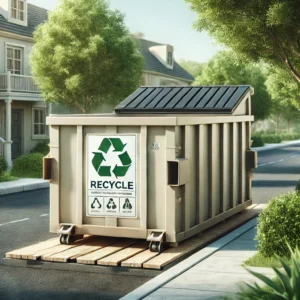
For those seeking immediate waste disposal solutions, finding a dumpster close to mecan be pivotal. Local dumpster rental services often provide quick and convenient options, ensuring easy access to waste management. This article explores how to locate these services efficiently and highlights essential tips for selecting the right dumpster for any project.
Understanding the types of dumpsters available is crucial for making an informed decision. Whether it’s for a home renovation, a large cleanup, or a construction site, knowing the size and type of dumpster needed can save time and money. This blog post will guide readers through the various options and help them navigate the rental process seamlessly.
In addition to location and size options, readers will gain insights into rental costs and any additional fees. With the right information at hand, finding a dumpster nearby can become a straightforward task, leading to more organized and efficient waste disposal.
Finding the Right Dumpster Rental Service
Selecting the right dumpster rental service involves careful consideration of various factors, including the type of company and the quality of their customer service. Understanding rental terms is also crucial for a smooth experience.
Local vs. National Companies
Local companies often provide a personalized touch. They understand community needs and may offer more competitive pricing. Their smaller operational structure usually means quicker service and easier communication.
National companies may have a wider range of options and more standardized processes. They typically operate on a larger scale, which can lead to better availability. However, their customer service may feel less personal, as they handle a high volume of rentals.
Consider the location. Local companies might have lower transportation costs, which could impact pricing. Always compare quotes to find the best deal and service level.
Evaluating Customer Service
Customer service is a key consideration when choosing a dumpster rental service. Positive experiences often reflect a company’s reliability and professionalism.
Look for companies with easily accessible customer support. Check for multiple contact methods, like phone, email, and chat. Read reviews to gauge customer satisfaction and responsiveness.
Assess how they handle inquiries. A company that responds promptly and clearly indicates a commitment to service. Also, inquire about their policies for late returns or damaged equipment.
Understanding Rental Terms
Understanding the rental terms ensures transparency and prevents unexpected charges. Customers should carefully read the contract before signing.
Key terms to focus on include rental duration, weight limits, and disposal fees. Knowing the specifics will help avoid extra costs.
Ask about additional charges, such as those for exceeding weight limits or prolonging the rental period. Clarifying these details upfront can improve overall satisfaction. Remember to confirm what items are prohibited from disposal to avoid penalties.
Choosing an Appropriate Dumpster Size
Selecting the right dumpster size is crucial for efficient waste disposal. Understanding capacity needs and available types of dumpsters will facilitate a more informed decision.
Estimating Dumpster Capacity Needs
To estimate capacity needs, individuals should consider the volume and type of waste generated. Common measurements for dumpster sizes are cubic yards.
Typical sizes include:
- 10 cubic yards: Suitable for small projects, like garage cleanouts or minor renovations.
- 20 cubic yards: Ideal for medium projects, such as home remodeling or larger cleanouts.
- 30 cubic yards: Works well for extensive commercial projects or major construction work.
- 40 cubic yards: Best for large-scale cleanouts, like whole house renovations or demolition.
Assessing the weight of materials is also key, as heavy debris may require special handling. For precise estimates, creating a list of items to be disposed of can help determine the appropriate size.
Types of Dumpsters Available
Dumpsters come in various types to cater to different waste types and disposal needs.
Common dumpster types include:
- Roll-off dumpsters: Frequently used for construction or renovation projects, these are delivered and picked up by truck.
- Front-load dumpsters: Ideal for businesses or ongoing waste collections, these dumpsters are emptied regularly.
- Compactor dumpsters: Suitable for commercial settings, they compress waste to save space and reduce pickup frequency.
Choosing the right type depends on the project’s scale and type of waste. Assessing the waste volume and frequency of disposal needs will guide the selection process effectively.
Buy Copper Stock: Key Insights for Investing in a Promising Market
Investing in copper stock can be a strategic move for those looking to diversify their por…